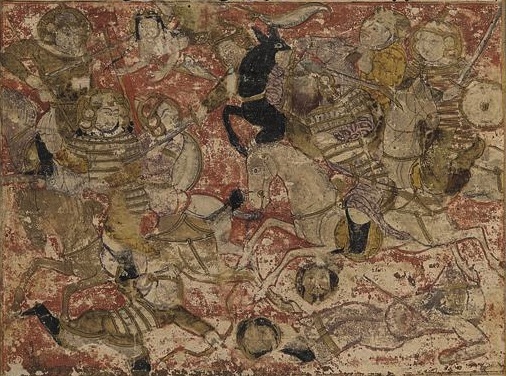
The Kharijites: The First Islamic Sect

By Luke McMahan / Arab America Contributing Writer
The Kharijites, the first known Islamic sect, formed after splitting from the followers of the fourth Caliph Ali, who was assassinated by one of their members, and removing themselves from the rest of Muslim society. On the whole, they had a uniquely democratic vision of the Imamate, but their ideology faded away as Muslim society grew more global and complex. It is believed by some that the Ibadi view of Islam in Oman may have possibly descended from this ideology.
Early History
Following the murder of the third Caliph Uthman, Mu’awiyah (governor of Syria and son of Abu Sufyan, former opponent of the Prophet) vowed to deny the appointment of new Caliph Ali until justice had been brought to Uthman. Because Ali was reliant on the support of the group implicated in the murder, he did not prosecute them, which prompted further discussions of whether he was actually implicated in the killing itself. Thus, Mu’awiyah declared war on Ali, an act which would result in part of the first Islamic Civil War (Fitna). Ali invaded Syria and their clash, the Battle of Siffin, lasted three days. In the final confrontation, Mu’awiyah’s soldiers famously marched into battle with pages of the Quran impaled on their swords, demanding arbitration, which Ali finally consented to.
A group of his followers were furious, claiming that the Caliph had disobeyed the Quranic passage, “If one party rebels against the other, fight against that which rebels,” instead agreeing to terms with them. Ali refused; so the group then separated themselves from the Caliph and settled in the village of Harura. This gave rise to the group’s names: the Kharijites (Arabic- Khawarij), which comes from the Arabic “to go out,” and the Haruris. There, they chose Ibn Wahb to be their leader. Meanwhile, after the arbiters chose Mu’awiyah to become Caliph, Ali prepared for battle against the Syrians. He requested the presence of the Kharijites, which they refused. Then, the group chose to resettle in Nahrawan, on the way engaging in terror, aggression, and several crimes against their many opponents. Ali took notice, and after failed peace talks, the Battle of Nahrawan commenced. The Kharijite ranks were devastated; and nearly all, including Ibn Wahb, perished. But the group survived; and three years later, Kharijite Ibn Muljim stabbed Ali with a poisoned sword as he was attending dawn prayer in the city of Kufa. Ali died a few days later. The group would later split many times over and some of its different iterations became one of the foremost enemies of the Umayyad Empire, of which Mu’awiyah was the first Caliph.
Beliefs
While its later various subsects exhibited different manifestations of these qualities, there are a number of aspects that separated Kharijites at large from their fellow Muslims. Perhaps chief among them is their idea of the imamate. While they viewed the first two Caliphs, Abu Bakr and Umar, as rightly guided, they thought Uthman and Ali had both veered from God’s path. So when neither repented, both the caliph and their followers were no longer considered Muslims. And because Ali, Mu’awiyah and the Umayyads, and later the Abbasids had no veritable claim to the imamate, the Kharijites often lived without a leader in this sense. They deemed the imamate to solely be based on merit (excluding women and slaves). No quality of empire, heredity, or tribe should enter into consideration. The imam would then be chosen by a unanimous vote of every free male of society. If the imam transgressed divine law, as was the case with Uthman and Ali, he must repent or face forceful removal. The caliph or imam was chosen solely for exhibiting a higher degree of purity than most as judged by the community, a practice akin to older tribal practices. Thus, many judge the Kharijites now as employing a more democratic view of Islam.
Even with the imam’s power, he still had to confer with scholars to perform many of his duties; and thus it was possible for Kharijite subsects to live without supporting the Imam of the time. This vision of the imamate was unique in its representative aspects, the Kharijites were still a conservative sect. They believed themselves to be ruling in accordance with the early caliphal system of Medina: combining Arab tribal management with the tenets of Islam. Yet problems arose to which the Kharijites had no answer. As Patricia Crone writes in Medieval Islamic Political Thought, these include, “How can one ensure that a man receives unqualified obedience as long as he is meritorious without thereby depriving the community of the power it needs in order to depose him when he errs? Conversely, if it is up to the community to decide whether the imam is right or not, how can one ensure that it will obey his orders? Who, moreover, is to decide whether a ruler has erred or not, how is disagreement among the decision- makers to be resolved, and by what procedures is he to be removed?”
The Kharijites were uniquely democratic yet were constantly plagued by societal chaos due to problems with the questions above. To solve this, one subsect, the Najdiyya, controversially claimed for a time that Islamic law did not necessitate the presence of a ruling imam. But with Islam spanning more and more global territory and Muslim society growing even more complex, enthusiasm for a return to tribally informed systematization dwindled. Various subsects of the Kharijites survived outside the cities; but Kharijism as an alternate ruling philosophy died out early in the Abbasid age.
Check out our Blog here.
Sources:
https://www.britannica.com/topic/Kharijite
https://www.britannica.com/event/Battle-of-Siffin
https://www.historytoday.com/archive/caliph-ali-assassinated
https://en.wikishia.net/view/Battle_of_Nahrawan
https://en.wikishia.net/view/Khawarij
https://en.wikishia.net/view/%27Abd_Allah_b._Wahb_al-Rasibi
CRONE, PATRICIA. “THE KHĀRIJITES.” Medieval Islamic Political Thought, Edinburgh University Press, 2005, pp. 54–64. JSTOR, http://www.jstor.org/stable/10.3366/j.ctt1r1z0k.10. Accessed 8 July 2024.
Discover more from reviewer4you.com
Subscribe to get the latest posts to your email.





